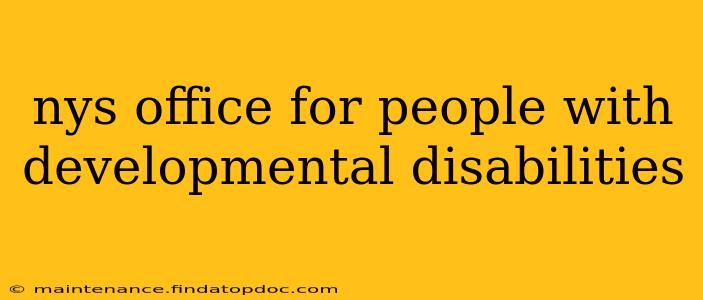The New York State Office for People With Developmental Disabilities (OPWDD) is a crucial agency supporting individuals with intellectual and developmental disabilities (I/DD) and their families. Understanding its services and how to access them is vital for anyone seeking support within the system. This comprehensive guide will navigate the complexities of OPWDD, addressing key questions and providing valuable information.
What services does the OPWDD provide?
The OPWDD offers a wide array of services designed to enhance the lives of individuals with I/DD. These services are person-centered, meaning they are tailored to the individual's unique needs and goals. They range from residential services, such as group homes and supported apartments, to community-based services like day habilitation programs, employment support, and respite care for families. The agency also provides funding for various supports and services, connecting individuals with the resources they need to live fulfilling lives. Specific services offered can vary depending on individual needs and location.
How do I apply for OPWDD services?
The application process for OPWDD services begins with a referral. This can come from a physician, a social worker, a school, or even a family member. After a referral, an assessment is conducted to determine the individual's needs and eligibility for services. This assessment typically involves interviews, observations, and evaluations. Based on the assessment, an individualized service plan (ISP) is developed, outlining the specific services and supports the individual will receive. It's crucial to work closely with the OPWDD and your case manager throughout this process. Contacting your local OPWDD office is the first step in beginning this process.
What is the difference between OPWDD and other disability service providers in New York?
While OPWDD is the primary state agency responsible for individuals with I/DD, other organizations and agencies also play crucial roles in providing support. These include local departments of health and social services, private non-profit organizations, and managed care organizations. OPWDD often works in collaboration with these entities to ensure a comprehensive network of support. The key difference lies in OPWDD's role as the primary funding and regulatory body for I/DD services in the state, overseeing quality and ensuring adherence to standards. Other providers often deliver specific services under contract with, or in partnership with, OPWDD.
What are the eligibility requirements for OPWDD services?
Eligibility for OPWDD services is determined through a comprehensive assessment focusing on the presence of a developmental disability that significantly impacts daily living. The specific criteria can be complex and involve evaluating the individual's functional limitations and the need for ongoing support. Age is not a limiting factor; services are provided to individuals across the lifespan. Detailed criteria are available on the OPWDD website, and prospective applicants should work closely with case managers to understand their eligibility status.
How can I find my local OPWDD office?
Locating your local OPWDD office is straightforward through the OPWDD website. The website typically includes a search function allowing individuals to input their address and find their designated regional office. Alternatively, a simple Google search of "OPWDD [your county/region]" should provide contact information. It's important to contact the regional office directly to begin the application process or obtain further information regarding services.
What is an Individualized Service Plan (ISP) and how does it work?
The Individualized Service Plan (ISP) is a crucial document outlining the specific services and supports an individual will receive from OPWDD. It's developed collaboratively with the individual, their family, and a team of professionals. The ISP details the individual's goals, strengths, and needs, specifying the type, frequency, and intensity of services. The ISP is regularly reviewed and updated to ensure it continues to meet the individual's evolving needs.
This guide provides a foundational understanding of the New York State Office for People With Developmental Disabilities. Remember to consult the official OPWDD website and contact your local office for the most up-to-date and specific information relevant to your situation. Navigating the system can be challenging, but with the right information and support, individuals with I/DD can access the services they need to thrive.
